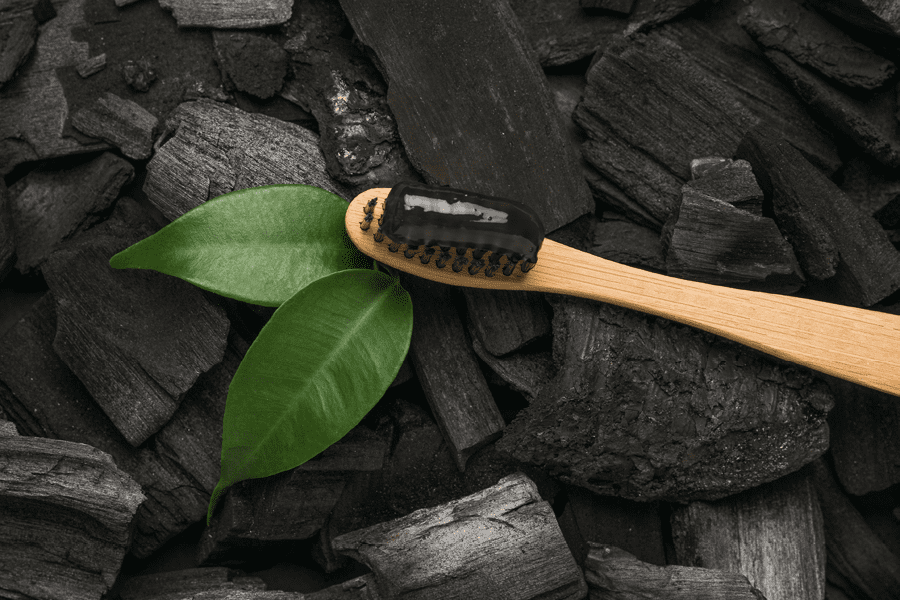Is Activated Charcoal Safe for your Smile?

*Updated February 2023
The teeth whitening trend has turned black, thanks to activated charcoal. Between brushes and pastes, brands are have marketed charcoal as a miracle mouth product. But does the black powder actually make a difference when it comes to oral health? Take a look at the science behind the trend.
What is activated charcoal?
Activated charcoal is very different from the kind you throw on the grill. Charcoal becomes “activated” when it is treated with oxygen at extremely high temperatures. This causes the charcoal to become larger and more porous.
Activated charcoal has many uses including emergency poison treatment, increasing kidney function, and reducing cholesterol levels. In addition to medical uses, activated charcoal can also be found in a variety of cosmetics, including toothpaste.
Is activated charcoal good for teeth whitening?
The effectiveness of activated charcoal as a teeth whitening tool is just beginning to be studied. Therefore, there is not a lot of evidence that suggests the product is scientifically proven to whiten teeth.
A new study from PubMed found that activated charcoal is less effective at whitening teeth when compared to alternatives. It is also suggested that it may be less safe due to its abrasive nature.
Another study concluded that activated charcoal toothpaste was no more effective at whitening than the average fluoride toothpaste after 12 weeks of use. Interestingly, the teeth became rougher after using the activated charcoal toothpaste.
If you are considering adding activated charcoal products to your oral health routine, it is a good idea to reach out to your dentist. They may have more effective and safer alternatives that may be a better choice for you.
Is activated charcoal good for teeth?
If you’re using activated charcoal toothpaste for whitening, you might wonder if the product is safe for your teeth. Unfortunately, the abrasiveness and general lack of fluoride in the product can do more harm than good when it comes to your teeth. In addition to causing damage to your tooth’s enamel, abrasive products can lead to other oral health problems such as gum recession and a higher risk of tooth decay.
The bottom line on activated charcoal products
Despite the exaggerated claims of many oral health products, activated charcoal may do more harm than good when it comes to whitening your teeth. Therefore, many dental health professionals do not recommend it as a solution to their patients.
For more information about tooth whitening, check out this blog.
Related stories
-
When your child says “I’m scared of the dentist”
We know visits to the dentist play a critical role in maintaining a child’s oral health. That … Read More
-
Creative Learning For Kids: How to Make Elephant’s Toothpaste
This kid-friendly experiment, nicknamed “Elephant’s Toothpaste,” is a fun way to teach little ones about chemical reactions. … Read More
-
Why eye exams are essential for kids’ vision
*Updated August 2024 You know to visit the dentist at least once a year for preventive check-ups, … Read More
Sign Up Now
Most Liked
- 1 Do Expiration Dates on Dental Products Matter? 305 Likes
- 2 Is Activated Charcoal Safe for your Smile? 167 Likes
- 3 Crazy and Cool Fish Teeth Facts 92 Likes
- 4 What Are Tonsil Stones? 81 Likes
- 5 Delta Dental Protects Your Eyes with DeltaVision® Coverage 74 Likes
- 6 The In-between Tooth: Guide to Bicuspids 53 Likes
- 7 Recipe: Quick Pumpkin Pudding 49 Likes
- 8 Bad Taste After Brushing? Common Explanations 44 Likes
- 9 People with Dental Benefits are Healthier 40 Likes
- 10 Own Your Oral Health: Subscribe now for tips to ensure a bright smile 39 Likes




